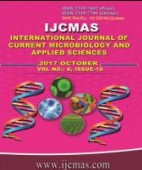


 National Academy of Agricultural Sciences (NAAS)
National Academy of Agricultural Sciences (NAAS)

|
PRINT ISSN : 2319-7692
Online ISSN : 2319-7706 Issues : 12 per year Publisher : Excellent Publishers Email : editorijcmas@gmail.com / submit@ijcmas.com Editor-in-chief: Dr.M.Prakash Index Copernicus ICV 2018: 95.39 NAAS RATING 2020: 5.38 |
Sustainability of the rice–wheat rotation is important to Asia’s food security. Intensive cropping with no return of organic materials results in loss of soil organic matter and is not sustainable. We studied the impact of application of green manure crop like dhaincha (Sesbania aculeata), vermicompost and farmyard manure (FYM) in conjunction with inorganic fertilizers on aggregate stability, distribution of organic carbon (C), available nitrogen (N) and productivity of succeeding wheat in aerobically grown basmati rice in rice–wheat cropping on a sandy loam soil. Macroaggregates (0.25 mm) constituted 20–30% of total water stable aggregates (WSA) and were linearly related (R2 = 0.69) to soil organic carbon content. The incorporation of dhaincha and FYM significantly improved the formation of macroaggregates with a simultaneous decrease in the proportion of microaggregates at all the sampling depths (0–5, 5-10 and 10–15 cm). Macroaggregates had higher C and N density as compared to microaggregates and the improvement was greatest in plots that received both dhaincha and FYM each year this will help in sustainable rice – wheat productivity in the region.
 |
 |
 |
 |
 |